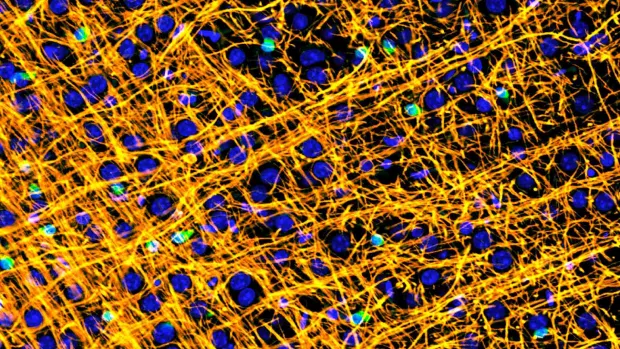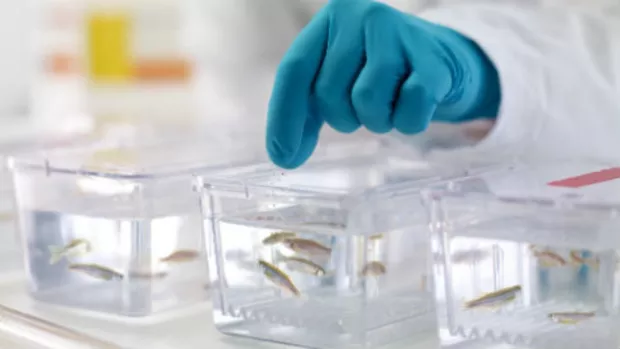
A bright future for myelin repair research
We continue to support research at our Centres of Excellence in Cambridge and Edinburgh. Professor Thora Káradóttir is co-lead of the Cambridge Centre. In 2021, she told us about their research.
The MS Society Cambridge Centre for Myelin Repair is all about bringing together researchers with a shared vision. We all want to achieve the same ultimate goal – a world where there are no consequences of an MS diagnosis.
And we all believe discovering ways to boost the body’s natural ability to repair myelin - the protective covering around nerves that’s damaged in MS – is key. Although we come at it from different perspectives, working together massively enhances the work we could do individually.
I’m interested in how brain cells communicate with each other. But to understand MS, we need to know how they communicate with immune cells too. For that, I need an immunologist. At the Centre, there’s always the right expert to hand.
MS Society Centres of Excellence: One big happy family (no really!)
One exciting thing about this phase is our focus on training the next generation of myelin repair experts.
Students will be co-supervised by researchers from different areas of myelin repair research, so they’ll be perfectly placed to see patterns we might otherwise miss. And our partnership with the Edinburgh Centre for MS Research will give them access to an even broader community of MS experts.
They’ll get first-hand experience of how collaboration allows you to do more exciting, fruitful work and can take that lesson into their future careers.
Ageing and myelin repair
One of our key ambitions is to understand how myelin repair interacts with ageing. MS affects people of all ages, but it doesn’t happen exactly the same way for a six year old, a sixteen year old and a sixty year old.
I’m a lab scientist looking at how nerves notify other cells in the brain that their myelin has been damaged. Like a ship that’s hit an iceberg – the captain needs to send out a distress call to get rescued.
We’ve discovered this communication changes as we age. For instance, there’s a period of time when those other cells don’t want to listen to the distress call. We need to find out what drives these differences, so we can help the rescuer cells at all ages behave like the happy, communicative cells of young adulthood.
New research findings stemming from the Centre shows that changing a single gene can boost myelin repair in older mice. We could use this information to find new myelin repair treatments.
Cutting-edge brain imaging
What’s great about the Centre is that each piece of research feeds into the next like a production line.
So some of my colleagues use my findings to run small trials testing drugs that may help nerve cells communicate more effectively.
Another group are working on how we could use MRI to measure myelin repair as standard in MS clinics. We’ve started doing this in some clinical trials but if it became routine, we’d get so much valuable data on how myelin repair changes as you age.
Not only could we exploit that information to develop new treatments, but neurologists could say to people “your brain is repairing better than it was a year ago”. So people will have more certainty.
A bright future
When I was born in the 1970s, an MS diagnosis was utterly different to a diagnosis today. Few neurological conditions have seen anything like the progress in treatments we’ve had in MS.
Cambridge researchers made a huge contribution to that change. Like my co-lead Professor Alasdair Coles, who was instrumental in developing alemtuzumab (Lemtrada), a highly effective treatment for relapsing MS. And more recently, led a trial which showed enhancing myelin repair in people with MS is possible.
I’m incredibly honoured to now be working with them to bring about the next revolution in MS – treatments that will stop MS getting worse.
To stop MS, we need you
In 2022, the first person joined a new myelin repair trial at the University of Cambridge, led by Professor Alasdair Coles.
More than 130,000 people in the UK live with MS. For some, research has found treatments. But too many people still don’t have anything to stop their MS getting worse, and some don’t have any treatments at all.
That’s why we won’t stop until we have treatments for every type of MS, to transform the lives of everyone with the condition. We’re aiming to be in the final stages of testing a range of treatments for everyone with MS by 2025. But we can’t get there without support from people like you.
Please donate today and, together, we can stop MS.




